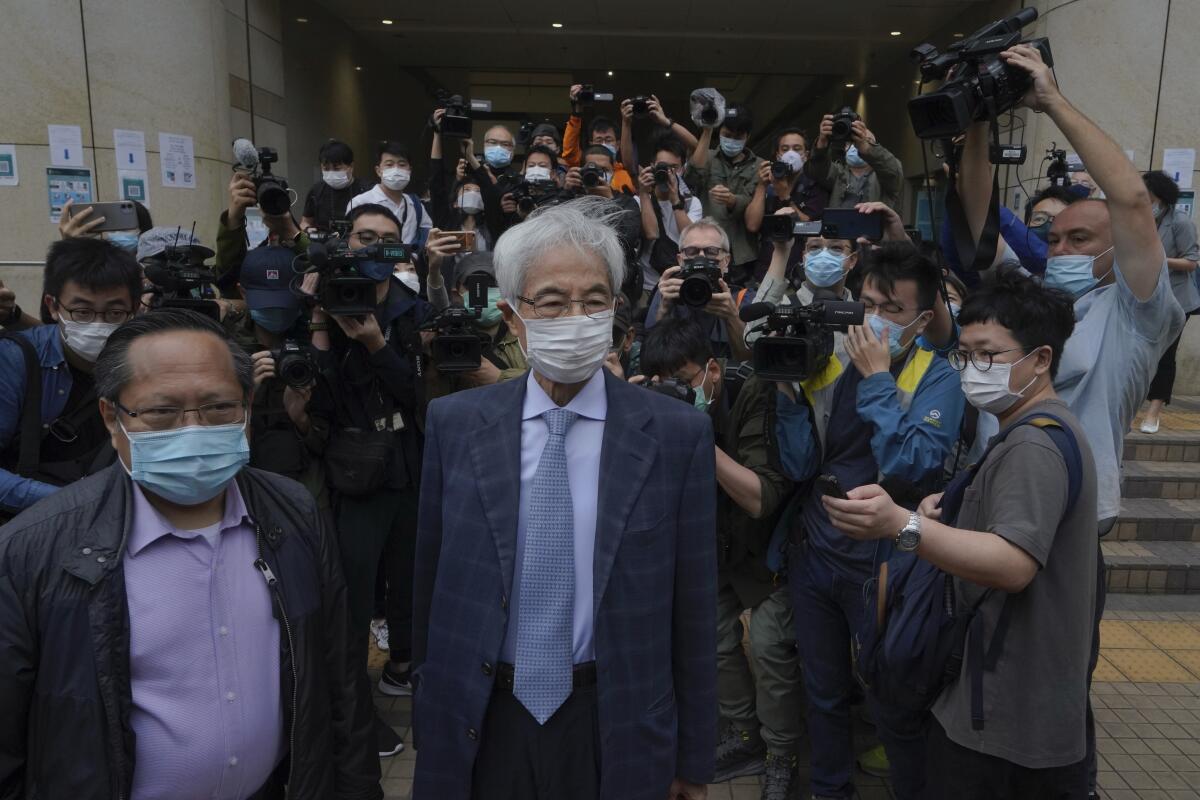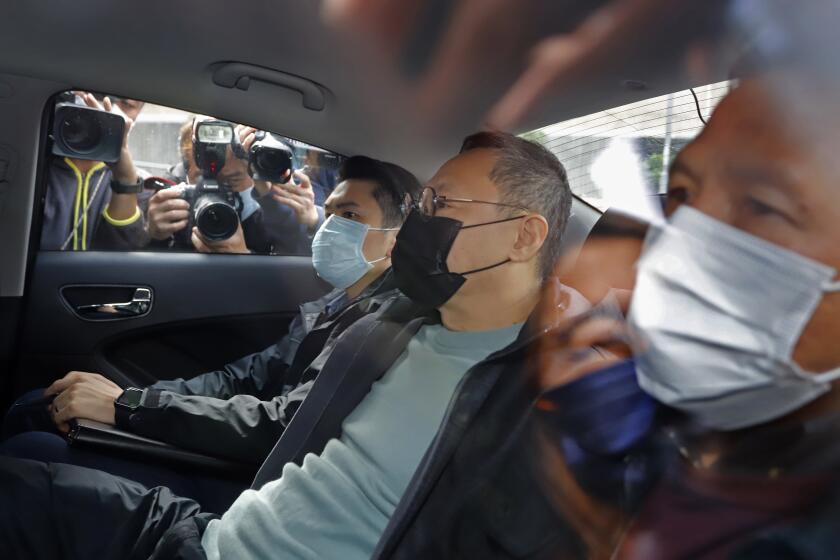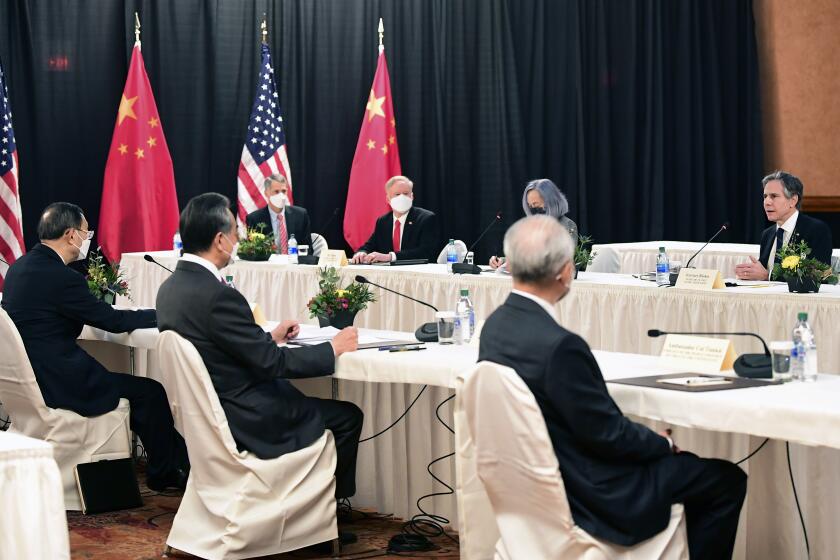Hong Kong pro-democracy leaders given jail terms amid crackdown on dissent

- Share via
HONG KONG — A Hong Kong court Friday sent five leading pro-democracy advocates, including media tycoon Jimmy Lai, to prison for up to 18 months for organizing a march during 2019 anti-government protests that triggered an overwhelming crackdown from Beijing.
A total of nine activists were given jail terms, but four of them, including 82-year-old lawyer and former lawmaker Martin Lee, had their sentences suspended after their age and accomplishments were taken into consideration.
They were found guilty earlier this month of organizing and participating in a massive protest in August 2019, at which an estimated 1.7 million people marched in opposition to a bill that would have allowed suspects to be extradited to mainland China for trial. The protest was not authorized by the police.
Their convictions and sentencing were the latest blow to the city’s flagging democracy movement amid an ongoing crackdown by Beijing and Hong Kong authorities on dissent.
The court suspended the 11-month prison sentence of Lee, who is known for his advocacy of human rights and democracy, for two years because of his age.
Lai, the founder of Hong Kong’s Apple Daily tabloid, was sentenced to a total of 14 months in prison Friday for charges related to the demonstration on Aug. 18, 2019, and a separate unauthorized march on Aug. 31, 2019.
Beijing’s dismantling of Hong Kong’s autonomy is all but complete. Those who dared challenge its authority now face years in prison.
Lai was also slapped with two additional charges Friday, one under the national security law accusing him of conspiring to collude with foreign powers and another accusing him of helping local activists to escape the city.
Prior to sentencing, he was remanded in jail on other charges, including collusion with foreign forces to intervene in the city’s affairs — a new crime under a national security law imposed on the city in 2020 by the central government in Beijing.
Lee Cheuk-yan, a pro-democracy activist and former lawmaker known for helping to organize candlelight vigils on the anniversary of the bloody 1989 crackdown on pro-democracy protesters in Beijing’s Tiananmen Square, was sentenced to a total of 14 months in prison for his participation in the the two August 2019 marches.
“I’m ready to face the penalty and sentencing, and I’m proud that I can walk with the people of Hong Kong for this democracy,” he said ahead of his sentencing, as supporters held up signs condemning political persecution. “We will walk together even in darkness. We will walk with hope in our hearts.”
When I was a young man in the 1970s, I joined hundreds of thousands of desperate Chinese to swim miles across the sea to Hong Kong, our beacon of freedom.
Lawyers Albert Ho and Margaret Ng both had their 12-month prison sentences suspended. Former lawmaker Leung Kwok-hung was sentenced to 18 months, while another former legislator, Cyd Ho, was given a jail sentence of eight months.
Two other former lawmakers, Au Nok-hin and Leung Yiu-chung, who previously pleaded guilty, were also given jail sentences. Au was sentenced to 10 months in prison, while Leung’s eight-month jail term was suspended.
In a separate case, former lawmaker Yeung Sum was sentenced alongside Lai and Lee Cheuk-yan for their participation in the Aug. 31, 2019, march, although his eight-month sentence was suspended for a year.
Hong Kong had enjoyed a vibrant political culture and freedoms not seen elsewhere in China during the decades it was a British colony.
News Alerts
Get breaking news, investigations, analysis and more signature journalism from the Los Angeles Times in your inbox.
You may occasionally receive promotional content from the Los Angeles Times.
Beijing had pledged to allow Hong Kong to retain civil liberties not permitted in mainland China for 50 years after the former British colony reverted to Chinese rule in 1997, but recently has ushered in a series of measures, including the national security law and electoral reforms, that many fear are a step closer to making Hong Kong no different from cities on the mainland.
Under the new rules, Hong Kong residents can be held liable for any speech or action deemed secessionist, subversive, terrorist or perceived as colluding with hostile foreign political groups or individuals. The electoral changes mean that just 20 out of 90 Legislative Council members will be directly elected, and Beijing will retain even tighter control over the body that picks Hong Kong’s top leader.
Most opposition figures in Hong Kong have now been jailed, intimidated into silence or have sought asylum abroad, and authorities have decreed that only those considered to be true Chinese patriots will be allowed to hold office in future.
Hong Kong’s last British governor, Chris Patten, said that the Chinese Communist Party’s “comprehensive assault” on freedoms of Hong Kong and its rule of law remained relentless.
Top U.S. and Chinese officials have sparred in a particularly contentious manner in the first face-to-face meeting since President Biden took office.
“This week, we have witnessed some of the most distinguished of the city’s peaceful and moderate champions of liberty and democracy placed in Beijing’s vengeful sights,” he said in a statement. “The CCP simply does not understand that you cannot bludgeon and incarcerate people into loving a totalitarian and corrupt regime.”
Amnesty International’s Asia-Pacific regional director, Yamini Mishra, said the sentences handed down Friday underlined the government’s intention to “eliminate all political opposition” in Hong Kong.
“Having arrested the majority of Hong Kong’s most prominent dissidents using the repressive national security law, the authorities are now mopping up remaining peaceful critics under the pretext of bogus charges related to the 2019 protests,” Mishra said.
More to Read
Sign up for Essential California
The most important California stories and recommendations in your inbox every morning.
You may occasionally receive promotional content from the Los Angeles Times.












